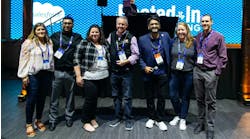Stratus, the Open Process Automation Forum, standards & success in Industry 4.0
Stratus Technologies recently announced their membership to The Open Group’s Open Process Automation Forum (OPAF) with the mission to help define next-gen edge-computing standards for industrial operators. As part of this membership, Stratus will collaborate with other OPAF members to unlock the true potential of edge technology.
“For nearly 40 years, Stratus has built a reputation for keeping business-critical systems up and running,” said John Vicente, Stratus CTO. “By joining The Open Process Automation Forum, we can now expand our work with industrial automation partners to create secure, reliable, and interoperable solutions that help these businesses modernize their operations and capture untapped value. Further, this membership aligns with our company values by delivering innovative solutions that simplify and protect the connected world our customers and partners rely on.”
Vicente added, “We’re looking forward to working with other industry leaders to not only respond to market requirements for customers with unique challenges in diverse industries, such as manufacturing, oil and gas, water and waste water, but also work to define these requirements.”
We wanted to learn more, so we connected with John. Take a look…
Smart Industry: What does this forum mean for the industrial-automation space?
John: It will help define next-generation edge-computing standards. It will absolutely help advance the process industry. Control systems today are evolving and with introduction of general-purpose computing, we at Stratus are taking leadership. Our position with the forum and its members is very important for that transformation. We have decades of experience delivering mission-critical technology, addressing the process industry, which puts us in good position to help other companies move forward.
Smart Industry: What is the state of standards in this arena?
John: Standards have been evolving for many years. What is changing is that IT and OT worlds are converging. The challenges we hear from end users is the high cost of technology refreshes, integration with third party suppliers, the ability to integrate independent systems with existing systems, etc.
Another big challenge that we face is developing standards related to security.
Smart Industry: What are the benefits of instituting standards in this fashion?
John: A lot of the technology standards and progress you see in process has happened for the right reasons—requirements for more deterministic behaviors, safety, etc. Many of the requirements prevalent in the process industry have evolved somewhat differently than they have evolved in the IT industry. While many technology concepts and related standards have progressed more rapidly in the IT world, such as flexibility in software, security design, the modernization of applications, big-data capabilities, marrying these IT and OT requirements and standards is important toward the success of the next-generation process industry. Through the OPAF forum, we are seeing the embrace of standards in both worlds.
We need standard interfaces between hardware. We need the ability to integrate hardware and software components. We need to allow third-party vendors to bring their innovations and give a choice to end users. The whole concept of software is innovation and participation.
Smart Industry: What most excites you about consensus developing around the edge space?
John: We are seeing one of the major transition—a very exciting transition—the fourth industrial revolution. With the progress we’re seeing in modern technology, the time is right for moving technologies like AI, wireless 5G, and vision or perceptual applications into the industry.
The industry has been advancing and maturing these technologies for years—now we can interact with it and extract value from it. It’s not just about improving experiences; we are trying to push technology to the extreme edges, not just in the cloud or data centers. We’re embedding computing everywhere with the opportunity to improve the livelihood of the whole world. That’s the most provocative thing with this generation of technology.


